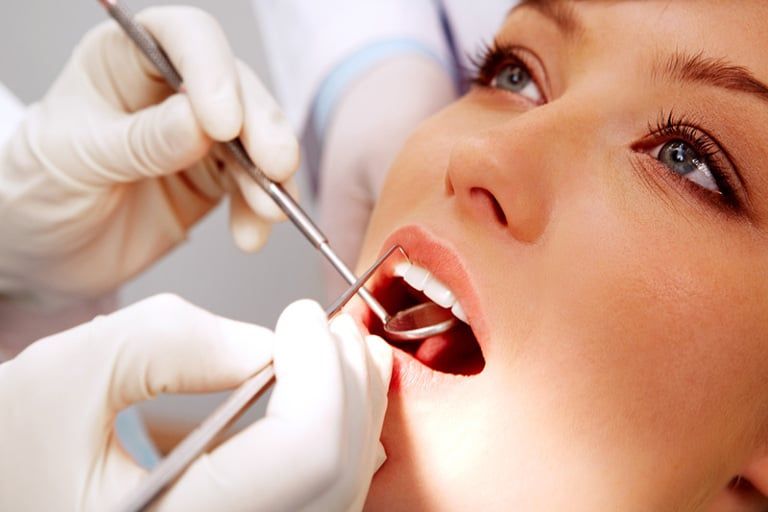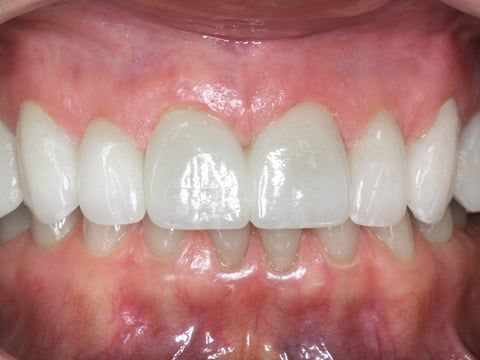Gum Disease Treatment
Gingivitis is the mildest form of gum disease and is characterized by swollen gums that bleed easily. Gingivitis is typically caused by poor oral hygiene habits, and is exacerbated by factors such as smoking, compromised health, and genetic predisposition.
Untreated gingivitis can advance to periodontitis. With time, unaddressed tartar will spread and produce toxins below the gum line, prompting an inflammatory response in which the body breaks down the effected tissue and bone.
In advanced stages of periodontitis, the gums then separate from the teeth, which may cause the teeth to become loose and lead to the need for extractions.
Gum disease often progresses without symptoms until the advanced stages of the disease; however warning signs may include red or swollen gums, bleeding during brushing and flossing, loose teeth, persistent bad breath and a change in bite. The good news is that gum disease is treatable. Dr. Javadi will evaluate your periodontal health and establish a treatment plan to address your needs.
About Periodontal Disease
Periodontal disease is an infection of the gums, which gradually leads to the destruction of the support of your natural teeth. This disease affects more than 80% of Americans by the age of 45.
Dental plaque is the primary cause of gum disease. Bacteria found in plaque produce enzymes and toxins which injure the gums. Injured gums turn red, swell and bleed easily.
If this injury is prolonged, the gums separate from the teeth, causing pockets (spaces) to form.
Plaque can also harden into a rough, porous substance known as calculus (tartar).
This can occur both above and below the gum line. As periodontal disease progresses, the supporting gum tissue and bone that holds the teeth in place deteriorate.
If left untreated, this leads to tooth loss. Pain is usually not present until damage from this disease is very advanced.

Healthy Gums
Healthy gums are generally pink and anchor the teeth firmly in place. Healthy gums do not bleed or hurt during normal brushing and flossing.
Early forms of gum disease can easily be treated and reversed with daily brushing and flossing and dental checkups every 6 months. Marin Reconstructive Periodontics can get you on your way to healthy gums. All you need to do is call (415) 454-1064 or request an appointment online and come in for a visit. Your gums will be glad you did!

Sensitivity
Teeth that are suffering damage from gum disease will always be more sensitive to cold; and if you avoid cleaning them due to this sensitivity, it can only make the problem worse.
After dental treatment, some teeth may be more sensitive because this is their way of dealing with injury. Injuries to teeth such as cavities, gum infection and jaw clenching can damage the nerves in a tooth. The sensitivity should not last long after treatment as long as your teeth are kept clean; otherwise, the sensitivity is likely to get worse. If your teeth are ever extra sensitive, please consult with Dr. Javadi as this could be a sign that you need a root canal or gum tissue treatment.
Periodontitis
Moderate gum disease is when the tooth's bone tissue starts to deteriorate. Periodontitis occurs when plaque byproducts destroy the tissues that anchor your teeth in the bone. The gums deteriorate and begin detaching themselves from the teeth forming gum pockets, which allows more plaque to collect below the gum line. This causes the roots of the teeth to become susceptible to decay. Generally, patients notice an increase in sensitivity to hot and cold and to touch.
Advanced Periodontitis
Advanced periodontitis occurs when a major amount of gum and bone tissue has been lost and the teeth are losing more and more support due to the loss of periodontal ligament and bone. Some teeth are unable to be saved and must be extracted. If left untreated, advanced periodontitis can cause severe health problems elsewhere in the body.
Periodontal Health Effects
Research has shown that gum disease can influence heart disease and other health conditions in negative ways. They suggest that gum disease could even be a more serious factor in heart disease than smoking, cholesterol, hypertension or age. One reason for this is the fact that the bacteria found in diseased gums can come loose and move throughout the body. When this bacteria reaches arteries, it can cause arterial plaque to build up and harden which in return adversely affects blood flow.
Gingivitis
Gingivitis is an early stage of gum disease. Gingivitis develops as toxins, enzymes and other plaque byproducts by irritating the gums, making them tender, swollen and likely to bleed easily. Gingivitis generally can be stopped with proper oral hygiene and minor treatment from your dentist. If this is achieved, your gums can return to a healthy state.